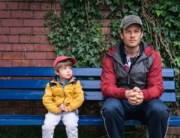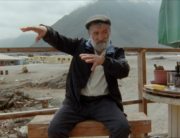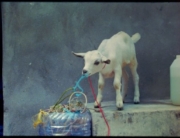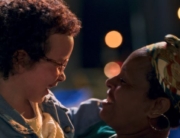
East Africa is on the scene. In the last few years, there have been a few films from the region that have played the festival circuit internationally. (Now what qualifies for a festival-worthy film, and who makes it, is a whole other subject for another discussion.) To name three: Lamb from Ethiopia in 2015, Kenya’s Rafiki from 2018, and this year’s The Gravedigger’s Wife by Somali-born writer/director Khadar Ayderus Ahmed.
All three represented their respective countries for the first time at the Cannes Film Festival, and the third film just had its North American premiere at the Toronto International Film Festival. Though the latter festival has scaled back the number of feature films compared to a pre-pandemic year—from roughly 300 to 100 titles—the programming has cast a wide net. Chad, Indonesia, Iran, Lebanon, and Turkey were among the countries represented in the lineup. (By contrast, the main competition at this year’s Venice Film Festival consisted overwhelmingly of North American and European productions.)
In his video introduction to The Gravedigger’s Wife, the director said that in making this drama he was “handing the microphone to voiceless people.” Indeed, Ahmed has made a movie that over the course of its 83-minute running time touches on many broad issues without overstatement. Yet it’s also one of the more suspenseful films at TIFF, a real movie-movie where you find yourself rooting for the main characters and maybe talking back to the screen, whether you’re in a theater in Toronto or—if you’re a Canadian festivalgoer—streaming this at home.
With his shovel in hand, Guled (an everyman Omar Abdi) returns from a day’s work as a gravedigger in Djibouti City to his home, made of wood and corrugated metal, lit with kerosene lamps. The filmmaker draws you into the man’s home life by creating a tangible closeness between the 45-year-old Guled and his headstrong wife, Nasra (Somali Canadian Yasmin Warsame, a model making a winning acting debut), who’s just a few years younger. They read each other’s minds and have a physical intimacy that easily answers any question of what they see in each other.
She has remained in bed all day because of a kidney infection and needs an operation to save her life, though Guled has nowhere near enough money for the surgery. They have used all of their money for medication, but he promises to find other ways to pay for the procedure. Nasra has but one request: he is not to return to his home village to plead for money, which is the first clue to the couple’s rocky relationship with the in-laws.
Despite how the description above may read, the film refrains from sentimentality as it deals with the day-to-day life of this family, which includes a son, Mahad (Kadar Abdoul-Aziz Ibrahim), through whom the film offers a mini portrayal of childhood: one day the boy is best friends with his mate Ali, while in the next they are enemies because of some sort of tiff. Weeks later, they easily resolve their differences. And when angry, Mahad reminds his parents that he is the only one in the household who knows how to read and write. That’s a 10-year-old for you.
Despite the couple’s predicament, the overall mood is more buoyant than bleak. In a charming interlude, Guled follows Nasra’s lead by crashing an upscale wedding, just like they used to do, though they have no invitation nor any idea who’s getting married. (Nasra cleverly comes up with a way to get in.)
The film takes on a more wide-screen epic scale in the third act, as Guled, after failing at hitchhiking, breaks his promise to Nasra and returns to his family. He hobbles through the desert and wears only one shoe. (Lest you think the film lacks a sense of humor, he, at one point, dons one red high heel shoe, a mismatch with his flip-flop, to climb a rocky incline.) The change of scenery and accompanying gorgeous cinematography expand the scope of the movie—including a wide shot at sunset of camel herders providing Guled water and shelter—but never in a way that overwhelms the story.
The Gravedigger’s Wife ranks high among the gems of the festival and would be an asset to any distributor’s lineup.






Leave A Comment